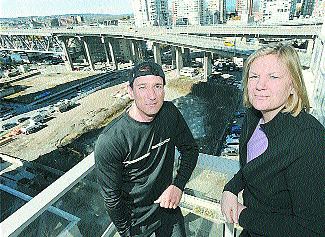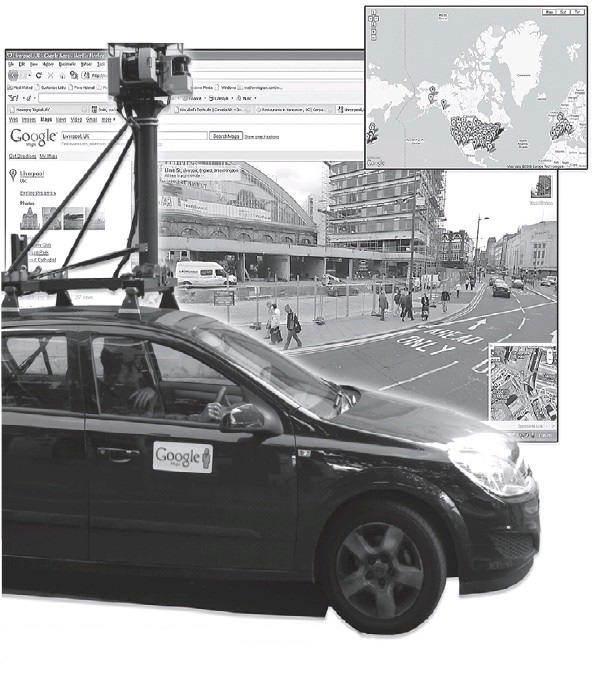Other
Archive for March, 2009
Like walking into someone’s kitchen
Thursday, March 26th, 2009North Van’s Ethical Kitchen serves up organic, wholesome food made from scratch
Mia Stainsby
Sun

Jazmin Riddell (left); Tessa Pauls, three months; Barbara Schellenberg, the baby’s mom; and sister Fiona Schellenberg of the Ethical Kitchen in North Vancouver. On the table is a beef burger, beef stock, borscht, pastries and a jitterbug, a bug-shaped hazelnut chocolate espresso cake. Photograph by: Stuart Davis, Vancouver Sun
ETHICAL KITCHEN
1600 McKay Rd., North Vancouver (across from Indigo Books)
604-988-6280
www.ethicalkitchenbc.com
Open Tuesday to Friday, 8:30 a.m. to 6 p.m.; Saturday, 10 a.m. to 5 p.m.
– – –
The name: Ethical Kitchen. The ambience: a lighter shade of The Naam. The staff: wholesome young women with fresh faces. Food: 99-per-cent organic. First impression: It’s a vegetarian haven, a Birkenstock collective.
So what a surprise — I had the most delicious, juicy burger here. The beef stew was crammed with very good beef. I could have had an equally meaty, juicy sausage on a bun.
When you put together the bits and pieces of information posted on the cooler display, you realize Ethical Kitchen is an unexpected mix of healthy and sustainable and lots of meat.
The owner, Barbara Schellenberg (the one with baby Tessa swaddled on her chest), comes about the meat thing naturally. Her parents are ranchers near Williams Lake, producing grass-fed, organic beef and lamb and organic pork and poultry. She started out marketing their meats (under the label Pasture to Plate) to Vancouver stores, but she longed for more people contact. At Ethical Kitchen she sells the meat from a walk-in freezer, but the dining area is more like a farm kitchen. A small menu of healthy dishes (her background also involves herbal medicine and body work) will delight carnivores who want wholesome, made-from-scratch food.
The burger ($13) came on a fresh-made sourdough bun (I saw the next batch proofing in bowls). Inside the bun, yummy condiments; it came with a crisp red and green coleslaw. A grilled fruit and Vancouver Island brie sandwich would have been excellent but for the bun, which in this case was too tough for the delicate filling, smooshing it into a mess.
Ethical Kitchen is open for breakfast, too, serving up waffles, flourless apple pancakes and bacon and eggs — it’s organic everything, nitrate-free bacon, orchard-run eggs, bio-dynamically grown potatoes, Jerseyland raw milk cheese.
Other dishes include: chicken coconut stew; sausage on a bun with a salad; sandwiches (beef, pork, chicken); gnocchi with tomato beef sauce; beef goulash; and a hearty salad plate.
Schellenberg’s mission is to return to the diet of a century ago.
“It’s something that worked. This isn’t a fad; it’s what traditional cultures do all over the world. It involves fermented vegetables, bone broths and organic foods from the local area,” she says.
She offers many fermented foods, good for digestion and anti-oxidant qualities — kombucha tea, kimchee, sauerkraut, house-made ginger beer and something called beet kvass, “a great blood builder,” she proclaims.
Even the house-made sourdough bread has fermented starter dough. Her stocks are simmered for three days until the bones break down and the minerals are all leached out. Hazelnut oil is expensive, but it’s local so she uses it.
Her walk-in freezer helps to keep food miles low. She freezes local fruits and vegetables in season. “I froze 3,000 pounds of tomatoes and a couple thousand pounds of fruit last summer,” she says. Even the kiwi is local.
Ethical Kitchen doesn’t preclude sweets. I fell into the hypnotic power of the bakery display. Jitterbugs will please the kid in you — they’re three-dimensional bug-shaped hazelnut chocolate espresso cakes dipped in dark chocolate. The muffins have a nice crisped top and a substantial feel.
Schellenberg has more plans up her sleeve. An edible hedge, for one. “We’re trying to grow as much food as possible — native plants, saskatoon berries, wild strawberries, huckleberries and we’re starting to grow our own micro-greens. And we’re hoping to do a roof-top garden and grow as much as we can on site. And we’re also planning to have a farmers’ market in the summer.” Instead of just marvelling at her energy, I’m thinking I should load up on kvass and kombucha.
She says the best compliment she’s received was when a customer walked in and told her it was like he’d “walked into some lady’s kitchen.”
© Copyright (c) The Vancouver Sun
Neighbours want impound yard gone
Monday, March 23rd, 2009Ian Austin
Province

Bob Chapman and Louise Labuda, who overlook the city’s vehicle impoundment yard at Pacific and Granville, say they hate the late-night noise the yard creates. Impatient residents claim there have been plans for years to move the yard to False Creek but the city has made no move to do so. Photograph by: Jason Payne, The Province
Condo owners near Vancouver‘s impound compound want to give Busters the boot.
For years the city has been discussing moving its bylaw impound yard from under the Granville Street Bridge, where it once was in an industrial area but is now ringed by residential highrises.
“It’s going to happen with the emergence of the residential area around the lot,” admits Busters Towing spokesman Vern Campbell.
“The city owns the lot.
“It really boils down to being in the hands of the Vancouver engineering department.”
Condo buyers were assured the lot was on the move, and checked the city archives to find out the lot’s fate.
“It operates 24/7, and there are car alarms going off all night long,” said Jennifer Myers, whose home overlooks the lot situated under the north end of the bridge. “We did our due diligence, we made sure that it wasn’t just a developer’s promise.
“We all did our homework.”
Their homework showed them the city has been discussing a move to the False Creek flats near Terminal Avenue since 1997, and even voted on a move in 2006.
“They told us it was going to be gone,” said Bob Chapman.
“If a tow truck comes in with a car-alarm going, it sets off other alarms — it’s like a chain reaction,” he said.
While the location is inconvenient for neighbours, it’s convenient for the city and for Busters.
Each morning and afternoon rush hour, Busters clears parked cars ignoring the no-parking signs on nearby commuter arteries such as Howe, Hornby, Seymour and Richards.
“It’s convenient for us and it’s also convenient for the people who pick up the cars,” said Campbell.
But the neighbours are tired of waiting, and have a petition with 250 signatures.
“Everyone knew it was going to take time, but we just didn’t expect it to take them forever,” said Louise Labuda.
© Copyright (c) The Province
Alteration to lot can void strata insurance
Sunday, March 22nd, 2009Tony Gioventu
Province
Dear Condo Smarts: We live on the upper part of Vancouver Island.
Our townhouse strata was informed by a new owner about a leak in their living room. The council inspected the home to discover that the previous owner back in January had removed the gas fireplace and installed a wood-burning stove and modified the existing windows. Water was clearly getting in around these areas.
We have hired a contractor who is returning the construction to the original, and we have instructed him to remove the wood-burning stove.
The new owner is furious because she intended to heat her unit with wood, not realizing she is already paying for gas heat as part of her strata fees.
Even the real-estate agent knew about the changes and didn’t say anything.
When do owners have to seek written permission of council before they make changes to a strata lot?
— M.J., Campbell River
Dear M.J.: Both the Standard Bylaws and your Strata Bylaw Amendments likely have all the direction you need to enforce these bylaws.
If you look closely at the Standard Bylaws under “alterations to a strata lot,” it says the owner needs written approval to alter a strata lot for the structure, the exterior, up to and including those parts of the strata lot that the strata corporation must insure under the act.
Here’s the big surprise for all strata owners. Fixtures and assets are items that must be insured, and that would include the original gas fireplace, and the original carpets, flooring, plumbing and electrical, and cabinets.
It might seem silly for the strata to have to approve an owner replacing their carpets, but don’t forget, if you upgrade or make betterments, the strata is no longer insuring those improvements.
When an owner makes alterations that are not approved — and in this case it would include the exterior of the building — the strata may do whatever is reasonably necessary to remedy the contravention.
This could mean restoring the damages to the original at the owners’ cost.
The new owner needs to contact a lawyer once she is aware of the costs, and consider a claim against the previous owner and the agent, who did not advise the purchaser of the unapproved alterations.
There are also serious fire-safety concerns and health concerns, including ventilation, about this conversion.
Was the gas connection terminated properly? Were any permits obtained? Is the venting susceptible to fire and the correct rating for this use?
The owner and the strata corporation also need to contact the local building inspector. An order may be issued by the local office to remove the installation, or a set of conditions may be issued for the requirement of upgrades and a permit, if the strata agrees to the alteration.
Whenever a strata discovers such a significant risk, it also now has a material defect that it is obliged to disclose to its insurance provider.
I’ve seen similar alterations where gas lines have been spliced to add a gas stove to a kitchen without permits or any consideration for safety. This alteration could affect the status of your insurance or your costs.
If you are aware of the risk and do not disclose or remedy it, and there is a fire, your strata could be faced with little or no insurance coverage.
Tony Gioventu is executive director of the Condominium Home Owners’ Association. E-mail him at [email protected]. The association’s website is www.choa.bc.ca.
© Copyright (c) The Province




